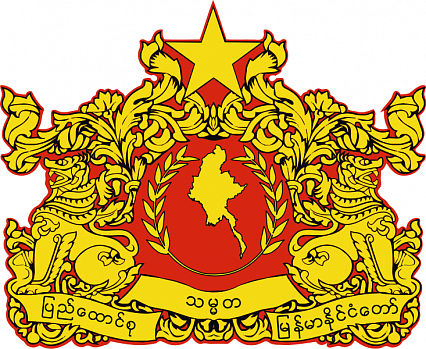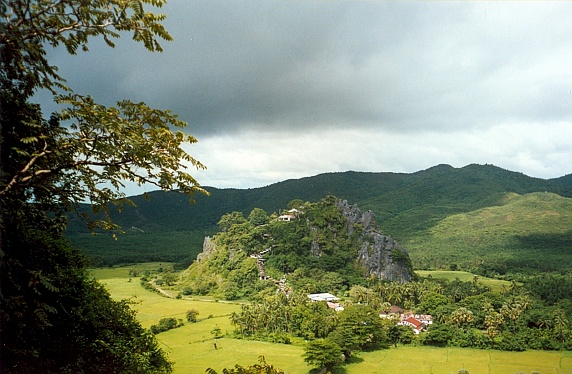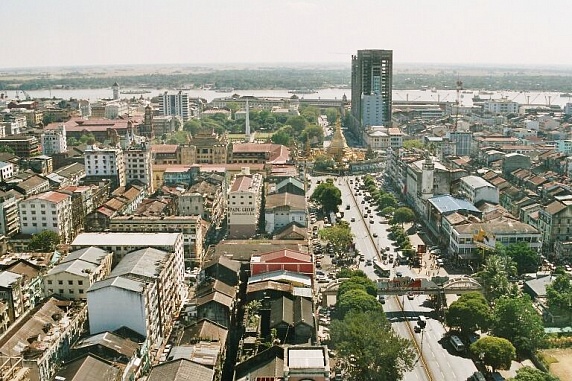 die Republik der Union von Myanmar
die Republik der Union von Myanmar
Statement and Answers of S.V. Lavrov, Minister of Foreign Affairs of Russia, to Questions from Mass Media at Joint Press Conference with Wunna Maung Lwin, Minister of Foreign Affairs of the Republic of the Union of Myanmar, 27 February 2012
Dear Ladies and Gentlemen,
Today, we have held negotiations with my colleague W.M. Lwin, the Minister of Foreign Affairs of Myanmar. We have discussed the further tasks within the process of intensification of the traditionally friendly Russian-Myanmarian relations and deepening of the interaction between the two countries in the international scene.
Strengthening of a range of bilateral relations with Myanmar fits the general Russian strategy on extension of interaction with the states of the Asia-Pacific Region (APR). We have confirmed the support of the policy pursued by the government of Myanmar, the internal transformations, and the policy aimed at the considerable extension of contacts with the external world. We will welcome and support these processes in any possible way. We stand assured of the necessity of wide international solidarity in regard to such policy of the country's government, and we also attach importance to lifting of the sanctions unilaterally introduced by some countries.
We have favoured the further extension of the Russian-Myanmarian political dialogue and strengthening of the contractual basis of the relations; we have also exchanged the opinions on the ways of expedition of a range of intergovernmental documents. We have discussed the issues of the trade and economic cooperation which volume is rapidly increasing though does not correspond to the capabilities of two countries as yet. We appreciate the concernment of our Myanmar colleagues about the attraction of the Russian capital to ensure good working attitude to economic operators of Russia.
The promising areas of interaction include power industry, resource development, transport, and telecommunications. The specific bilateral projects are already being discussed in all these areas. Both parties demonstrate the interest in the tightening and deepening of contacts in the areas of education, culture, and tourism. We think the Russians may well include Myanmar – a picturesque country with rich traditions – into the list of the countries interesting to be acquainted with.
As for international affairs, we have absolutely concurring views of the principles of the world order which should be just, democratic, and based on the supremacy of the international law. All problems shall be settled without violence, through negotiations, and with strict adherence to UN Charter.
Today, we have expressed the concern about strengthening of the safety structure in APR. Precisely such terms are specified in the joint Russian-Chinese initiative proposed in September 2010 during the visit of D.A. Medvedev, the President of Russia, to China and his negotiations with Hu Jintao, the President of the People's Republic of China.
Russia supports the efforts on promoting the central systematic role of ASEAN in the development of the processes in the Asia-Pacific Region. We appreciate the constructive activity of Myanmar as a coordinator of the dialogue partnership between Russia and ASEAN during the last three years. We have discussed the prospects of our contacts under the Eastern-Asian Summits which Russia and the USA joined last year, as well as the possibilities of cooperation in other forms with the systematic role of ASEAN.
We expect to continue the cooperation in all directions both in the bilateral and multilateral forms. I think the today's negotiations have helped to outline the specific ways of reaching this objective supported by the governments of the two countries.
I would like to thank my colleague and yield the floor to him.
Question (to both ministers): For some time, Myanmar has been pursuing the policy aimed at going out of the international isolation and development of international relations, including the economic ones. Are there any specific results of the Russian-Myanmar economic interaction? Does the visit of the Minister of Foreign Affairs of Myanmar to Russia have an economic component? What results do both parties expect from the visit?
S.V. Lavrov (responds first): During the meetings, Ministers of Foreign Affairs do not sign any specific documents but discuss the interaction procedure in whole, including the commercial and economic area. A number of Russian companies have already been working in the Myanmar direction in power industry, resource development, transport, and telecommunications. Some enterprises are taking interest in this market. We appreciate that the Myanmar colleagues have concernment for such approach. Today, we have agreed to activate the political work to prepare intergovernmental agreements, including an investment protection agreement and a number of other arrangements which would ensure more convenient conditions for the work of economic operators. From this point of view, the visit was very timely and useful.
Question (to S.V. Lavrov): How do you assess the referendum on the new constitution of the Syrian Arab Republic carried out in Damascus yesterday? Do you think that the fact of such referendum is a response to those sharp comments on the Syrian government during the Friends of Syria conference in Tunisia?
S.V. Lavrov: I think the referendum was conducted not in response to any comments, but as an important step towards the urgent reforms. When on 7 February, we visited Damascus with M.E. Fradkov, the Director of the Foreign Intelligence Service of Russia, President B. Asad informed us that such plan had already been approved and the project of new constitution would be put to a referendum at the end of February this year.
I have heard the comments of various political forces on the conducted referendum and the new constitution. Someone is disaffected; someone considers it to be an important step. I think those are right who recognize this as a movement towards democratization. The cease of the monopoly of one party in the political system should be welcomed in itself. The required additional reforms and the required amendments to the constitution should be decided not by external players, but the Syrians themselves under the national dialogue which should be an inclusive dialogue, i.e. the one which includes all of those who are interested in the strong and independent motherland.
Therefore, we insist that all political forces – both the government and the opposition – receive the signals from the outside that we wish to make them sit at the negotiating table for they can decide upon the future of their country by themselves. But certainly the violence which takes place in a number of Syrian regions, including some quarters of Homs, shall be terminated first. For this purpose the signals of the outer forces aimed at cooling-off all the parties are required. If the government is required to cease operations against the armed groups and the armed groups have no obligations to anybody, in such a case the reconciliation is unrealistic – this is what we are talking about.
The meeting in Tunisia was obviously an ex parte meeting. We still do not understand the status of the document released there which the participants of the meeting interpret in different ways. We have an impression that the meeting did not contribute to the creation of conditions stimulating all Syrians to start a political dialogue. This makes us feel regret. We will proceed achieving the influence on the fighting parties to cease the violence as soon as possible to avoid deaths among civilians.
We have supported the resolution of the UN Secretary General on the secondment of V. Amos, the UN Deputy Secretary General for Humanitarian Issues, to Syria. We are in close cooperation with the International Committee of the Red Cross (ICRC) assisting the representatives of the Red Cross to gain access to the regions where their help is required. We have also welcomed the appointment of K. Annan, the former UN Secretary General, to the post of UN and LAS Special Envoy on the Syrian crisis, who is entrusted to create the conditions for the preparation of the inclusive all-Syrian dialogue between the government and all opposition groups. He has a very important mandate.
We think we should work in unison in all these directions. We will welcome all initiatives which allow consolidating the world community based on the support of the solution elaborated by the Syrians themselves.
Question: In the article published in Moscow News newspaper today, V.V. Putin has put forward an initiative on recognition of the Iran's right to peaceful atom, including the right to uranium enrichment for peaceful purposes, by the world powers. Do you think whether it is worth to officially confirm this in a document?
S.V. Lavrov: Such right is already included into the Non-Proliferation Treaty (NPT) and into the regulations elaborated by IAEA based on this Treaty. According to NPT, each member-state may enjoy the benefits of the civilian nuclear power, including production of the fuel required for nuclear power plants. Under the Treaty, each state has not only rights but also obligations, one of which is to inform IAEA on all the works regarding creation of nuclear fuel cycle. Having started the nuclear programme long ago, Iran has not informed IAEA on everything. In this connection the questions appeared which all of us would like to clarify. We do not need a precedent of NPT violation. As all other countries, we want to be sure that the Iranian nuclear programme has only the peaceful dimension.
Russia is in close cooperation with IAEA and its partners under the Six – Great Britain, France, Germany, USA, and China. In our documents transferred to the Iranian party it is specified that as soon as all the questions of IAEA to Iran are clarified, Teheran, as any non-nuclear party to NPT, will enjoy all the rights under this Treaty in full. This also refers to the right to uranium enrichment for fuel production.
Though this right is included in the documents of the Six, it is not much emphasized in the contacts between the members of this group and Iran. It sometimes seems that once Iran commences the movement towards fulfilment of the requirements contained in the resolution of the UN Security Council and IAEA Board of Governors, someone wants to hinder or even frustrate such movement. In this regard it is important that each and all firmly confirm without any reservations, that if Iran clarifies all questions of IAEA, it will obtain all the rights of the non-nuclear parties to NPT, including the right to uranium enrichment for fuel production. I think this is a major task for today. It is fairly revealed in the last article by V.V. Putin.








